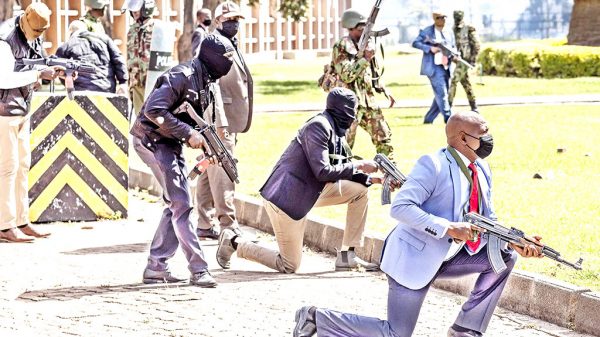Kenya protesters vow to march again

Shawdesh Desk:
Kenyan protest organisers called on Wednesday for fresh peaceful marches against deeply unpopular tax hikes, as the death toll from nationwide demonstrations climbed to 22, a state-funded rights body said, vowing an investigation.
Tensions sharply escalated on Tuesday, as police opened fire on demonstrators who stormed parliament, after the mainly youth-led rallies began mostly peacefully last week with thousands marching across the country against the tax increases.
The unprecedented scenes left parts of parliament ablaze and gutted and hundreds of people wounded, shocking Kenyans and prompting president William Ruto’s government to deploy the military.
On Tuesday afternoon, parliament passed the contentious bill containing the tax hikes, which must be signed by Ruto to become law.
But demonstrators vowed to hit the streets again Thursday as they called for the bill to be scrapped.
‘Tomorrow we march peacefully again as we wear white, for all our fallen people,’ protest organiser Hanifa Adan said on X.
‘You cannot kill all of us.’
Demonstrators shared ‘Tupatane Thursday’ (‘we meet Thursday’ in Swahili), alongside the hashtag #Rejectfinancebill2024 on social media.
‘The government does not care about us because they shot us with live bullets,’ Steve, 40, who was at the parliament Tuesday, said.
Ruto ‘victimised innocent people’, he said, adding he would march on Thursday: ‘I expect more violence and chaos.’
Roseline Odede, chairwoman of the state-funded Kenya National Commission on Human Rights, said ‘we have recorded 22 deaths’, adding that they would launch an investigation.
‘This is the largest number of deaths in a single day protest,’ she said, adding that 19 people had died in the capital Nairobi.
‘We have over 300 injured in our records and over 50 arrests,’ she added.
Earlier, Simon Kigondu, president of the Kenya Medical Association, said he had never before seen ‘such level of violence against unarmed people.’
An official at Kenyatta National Hospital in Nairobi said Wednesday that medics were treating ‘160 people some of them with soft tissue injuries, some of them with bullet wounds’.
In posts online, protest organisers shared fundraising efforts to support those hurt in the demonstrations.
Ruto warned late Tuesday that his government would take a tough line against ‘violence and anarchy’, likening some of the demonstrators to ‘criminals’.
‘It is not in order or even conceivable that criminals pretending to be peaceful protesters can reign terror against the people, their elected representatives and the institutions established under our constitution and expect to go scot-free,’ he said.
Shortly before his address, defence minister Aden Bare Duale announced that the army had been brought in to tackle ‘the security emergency’ in the country.
A heavy police presence was deployed around parliament early on Wednesday, according to an AFP reporter, the smell of tear gas still in the air.
A policeman standing in front of the broken barricades to the complex told AFP he had watched the scenes unfold on TV.
‘It was madness, we hope it will be calm today,’ he said.
In the central business district, where the protests have been concentrated, traders surveyed the damage.
‘They didn’t leave anything, just the boxes. I don’t know how long it will take me to recover,’ James Ng’ang’a, whose electronics shop was looted, said.
Ruto’s administration has been taken by surprise by the intensity of opposition to its tax hikes.
And while the rallies — mostly led by young, Gen-Z Kenyans — have been largely peaceful, tensions rose sharply Tuesday afternoon when officers fired at crowds near parliament.
Demonstrators then breached parliament barricades, ransacking the partly ablaze complex, with local TV showing burnt furniture and smashed windows.
AFP journalists saw three people bleeding heavily and lying motionless on the ground.
The unrest has alarmed the international community, with more than 10 Western nations including the United States saying they were ‘especially shocked by the scenes witnessed outside the Kenyan Parliament’.
Rights watchdogs have also accused the authorities of abducting protesters.
The police have not responded to AFP requests for comment.
Long-running grievances over the rising cost of living spiralled last week as lawmakers began debating the bill containing the tax hikes.
The cash-strapped government says the increases are needed to service the country’s massive debt of some 10 trillion shillings ($78 billion), equal to roughly 70 per cent of Kenya’s GDP.
The treasury has warned of a gaping budget shortfall of 200 billion shillings, following Ruto’s decision last week to roll back some of the most controversial tax hikes.
While Kenya is among East Africa’s most dynamic economies, a third of its 52 million population live in poverty.























Leave a Reply